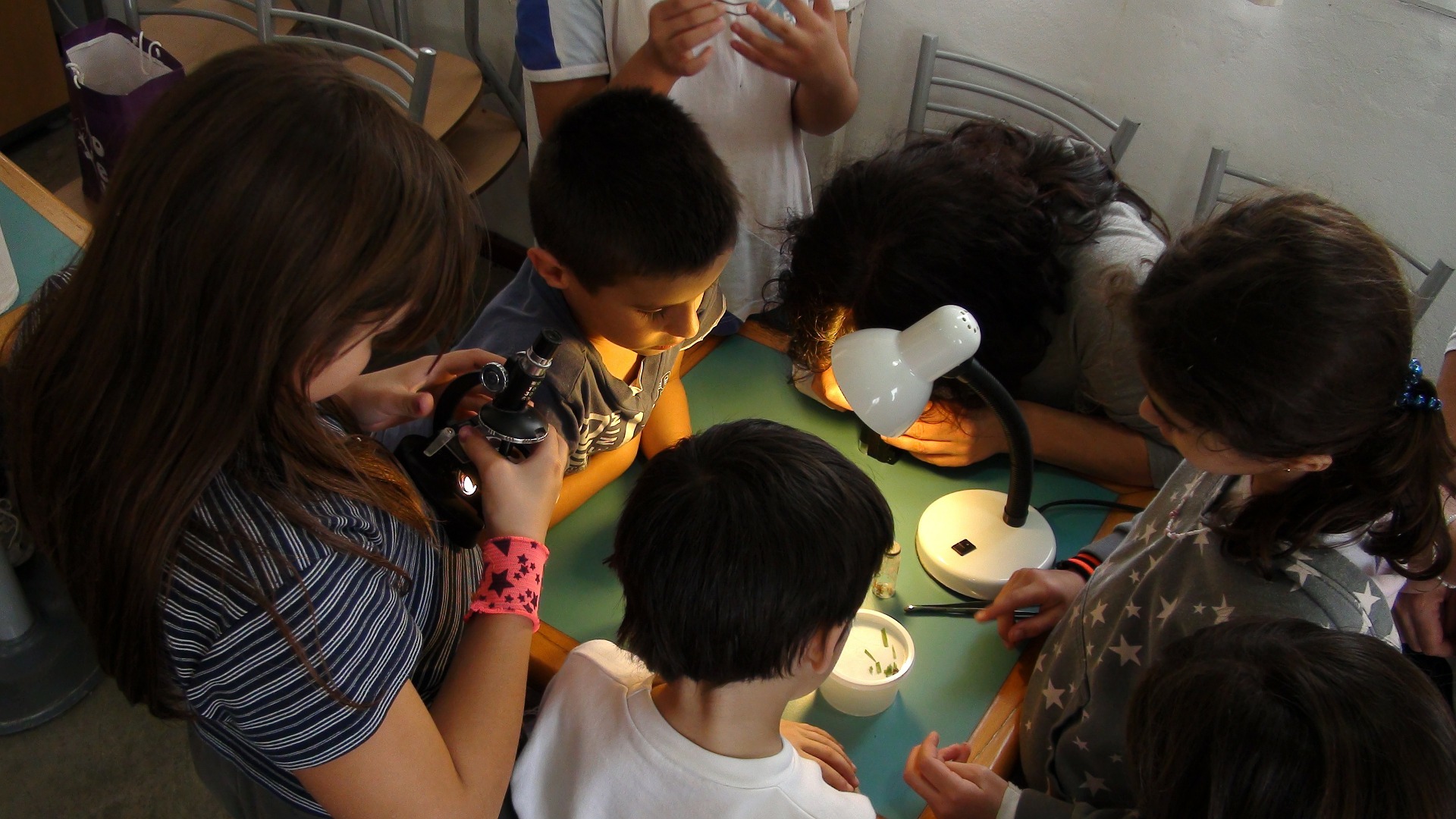Cognitive development: Vygotsky
 The Russian psychologist Lev Vygotsky argued that it is not possible to describe the process by which children cognitively develop without taking into account the child’s social environment or culture. Culture provides knowledge, and it teaches children what to think and how to think. Vygotsky’s sociocultural theory suggests that a child’s cognitive development is based on interaction with other people in order to develop cultural tools to understand the world.
The Russian psychologist Lev Vygotsky argued that it is not possible to describe the process by which children cognitively develop without taking into account the child’s social environment or culture. Culture provides knowledge, and it teaches children what to think and how to think. Vygotsky’s sociocultural theory suggests that a child’s cognitive development is based on interaction with other people in order to develop cultural tools to understand the world.
Cultural tools should be understood as both the implicit and explicit rules or norms in the culture. Knowledge is transferred via imitation, direct instructions, or collaborative learning. Language is the primary form of interaction that adults use to transmit to the child the knowledge that exists in the culture. Experiences with other people become internalized and form the child's mental representation of the world.
Vygotsky and Piaget both agreed that children actively construct knowledge and that they learn best if new knowledge is related to existing knowledge and abilities. Vygotsky argued that babies are born with “elementary mental functions” - that is, attention, sensation, memory, and perception. Cultural influences transform elementary functions into higher mental functions, such as problem-solving and thinking. Contrary to Piaget, Vygotsky believed that learning tends to precede development.
Vygotsky postulated that a child develops through interaction with a “more knowledgeable other.” This could be a parent, sibling, teacher, or peer who has a better understanding or higher ability level than the learner. The child seeks to understand the actions or instructions of the tutor and then internalizes the information.
An important element in sociocultural theory is the concept of the zone of proximal development, which refers to the difference between what a child can achieve independently and what a child can achieve with guidance and encouragement from a more knowledgeable other. A child can increase in competence if he or she receives assistance to perform a task that is just slightly beyond his or her current ability. This is called scaffolding. Successful scaffolding can change the child’s level of performance on a particular task.
Tudge & Winterhoff (1993) found that the best peer tutors are those who are significantly ahead of their tutees. However, if the tutor lacks confidence or fails to provide the necessary scaffolding, then the tutoring is ineffective. Simply interacting with a "More Knowledgeable Other" is not enough for a child to develop.
Finally, Vygotsky also believed in the importance of play. He said that play allows children to take on roles they would normally not be able to perform in real life, requiring them to solve problems and strategize about theoretical situations. This helps them to extend their cognitive abilities.
Research in psychology: Nichols (1996)
 Vygotsky argued that social interaction was the key to development and learning. Nichols (1996) carried out a study to find out if children working in groups would learn more effectively than if they were working alone.
Vygotsky argued that social interaction was the key to development and learning. Nichols (1996) carried out a study to find out if children working in groups would learn more effectively than if they were working alone.
90 American high school students were randomly allocated to one of three groups for one semester. One group had a half-semester of collaborative group learning and then a half-semester of traditional lecture. The second group had a half-semester of lecture and then a half-semester of collaborative group learning. The third group had a full semester of traditional instruction.
It was found that groups 1 and 2 showed significantly higher levels of motivation than group 3. In addition, motivation was highest during the collaborative group learning part of the course. This supports Vygotsky's theory that social interaction promotes development.
The role of language in development
Vygotsky also placed more emphasis on language than Piaget did. Vygotsky argued that one of the great developmental markers is the internalization of language - that is, language is not just used for communication, but for thinking and problem-solving.
Private speech is when people talk aloud to themselves. It is a means for children to plan activities and strategies. Studies have found that children who engage in large amounts of private speech are more socially competent than children who do not use it. For example, Winsler et al (2003) videotaped 32 three and four-year-old children doing a series of problem-solving tasks - some in the lab and some in their preschool classroom. They also carried out interviews and surveys with the parents and teachers. They observed that children's private speech patterns were generally stable across tasks and over time. They also found that based on the reports of the teachers and parents, those children who engaged in high levels of private speech had more highly developed social skills.
Vygotsky's stages of language development
Preintellectual speech. Language as a social contact. This includes crying, babbling, laughing, and gesturing.
Autonomous speech (12 months) The child begins to invent words for objects in an effort to communicate with adults.
Naïve psychology (begins at 18 to 24 months) The child begins to use adult words. As the child begins to name things, connections develop between words and objects. During this period, the young child's first expression is a simple word that conveys a greater meaning. For example, when the young child says 'car!' it may mean 'I see a car' or 'I want to go for a ride in the car!' As the child's thoughts become differentiated, he can formulate simple requests in the form of short and simple sentences.
Communicative and egocentric speech (around 3 yrs old) The child's speech splits into two types of speech: communicative and egocentric. Communicative speech is used to convey meaning to others. The child is able to use simple sentences, such as 'I want milk.' Egocentric speech is self-talk, that guides a child through a task with no intention of communicating with someone else.
From about the age of three to seven, there's a lengthy period of the development of egocentric speech. Egocentric speech often occurs in the presence of other children involved in the same activity, such as playing house together. It also occurs when the child is attempting to solve a problem. In these activities, the child's talk is a monologue; it is not intended to be a communicative form of speech. For example, if a child is trying to put together a puzzle, she might say "I need to first find a blue one. Here is a blue one. It should go near another blue one." She is not necessarily communicating with anyone; she is simply stating these directions for herself. This self-talk guides a child through a task.
During the preschool period, egocentric speech increasingly moves inward as inner speech. It is a silent form of verbal thinking. The psychological nature of inner speech is important because it represents the most advanced level of the relationship between speech and thinking.
Challenges to Vygotsky: Prior and Welling (2001)
 Vygotsky argued that younger children think aloud while solving problems until their speech has internalized A study by Prior and Welling (2001) wanted to test this idea by seeing if children at the preoperational stage of development who read a text aloud would understand it better than if they read it quietly to themselves.
Vygotsky argued that younger children think aloud while solving problems until their speech has internalized A study by Prior and Welling (2001) wanted to test this idea by seeing if children at the preoperational stage of development who read a text aloud would understand it better than if they read it quietly to themselves.
The sample consisted of 73 Canadian children aged 5 to 8 years old. They were selected for the sample after teachers confirmed that their reading level was appropriate for their age group. In one condition, the children were asked to read a text quietly to themselves; in the second condition, they were asked to read it aloud. They were then tested on their understanding of the passage.
The results showed that the younger children showed no difference in comprehension, whether they read the text quietly or aloud. The older children, however, performed best when they read aloud! This contradicts Vygotsky's theory of the development of internalized speech.
One study alone would never discredit a theory. However, the research on the role of speech in learning is controversial and often conflicting in its findings.
TOK: Thinking ethically
Take a look at this very cool Ted Talk. Deb Roy uses modern technology to map the language development of his own son. Many of the comments he makes show that he is applying Vygotsky's ideas of development to his own son's development of language.
This is an amazing example of how modern technology can be used to gather a lot of data which gives researchers a richer understanding of child development. And like Piaget, Roy is studying his own child. But do you think that this is an ethical study? Why or why not?
Students will have different opinions on this one. There is no harm that comes to the child by being monitored at all times and the research gives us a very interesting understanding of how words are developed over time in the developing child.
That being said, there are some concerns about researchers studying their own children. This may, however, may be more about objectivity than ethics. The ethical concerns tend to focus on consent, which the parent is required to give. In this case, consent is granted. It is important that the child is able to withdraw, but in this case, as there is no harm to the child, this is perhaps not such a concern.
My personal opinion? Creepy, but most likely not a violation of ethical standards.
A comparison of Piaget & Vygotsky
- Both theorists believed that young children are curious and actively involved in their own learning.
- Both theorists acknowledge the role of biological maturation in a child's development.
- Piaget argues that cognitive development is a universal process that occurs in defined stages. Vygotsky places more emphasis on culture affecting cognitive development.
- Vygotsky placed more emphasis on the role of language in development. Piaget does not address this.
Evaluation of Vygotsky's sociocultural theory of cognitive development
- The theory has been successfully applied in teaching - for example, in the use of scaffolding and cooperative learning.
- The theory takes a more holistic view of development than Piaget's theory.
- There is a lack of empirical support for some of his theories - especially with regard to the role of language in development.
Checking for understanding
A key difference between Vygotsky and Piaget's theories of development is
The difference between what a child can achieve independently and what a child can achieve with guidance and encouragement from a more knowledgeable other is referred to as
What was the dependent variable that was measured in Nichols (1996) study of cooperative learning?
Which of the following would be a concern about the study done by Winsler e al (2003) on private speech?

 IB Docs (2) Team
IB Docs (2) Team
